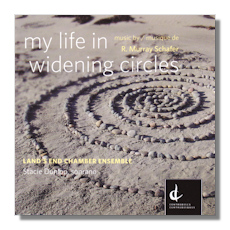
The Internet's Premier Classical Music Source
Related Links
- Schafer Reviews
- Latest Reviews
- More Reviews
-
By Composer
-
Collections
DVD & Blu-ray
Books
Concert Reviews
Articles/Interviews
Software
Audio
Search Amazon
Recommended Links
Site News
 CD Review
CD Review
R. Murray Schafer

My Life in Widening Circles
- Trio for Violin, Viola & Cello
- Wild Bird
- Kinderlieder
- Duo for Violin & Piano
- Six Songs from Rilke's "Book of Hours"
Stacie Dunlop, soprano
Land's End Chamber Ensemble
CMC Centerdiscs CMCCD17712
Raymond Murray Schafer (who was born in 1933) is a polymath. A Canadian composer, educator, environmentalist and writer, he is perhaps best known for his World Soundscape Project, for his alarm at the ways – many malignant – in which ambient sound affects us. His book "The Tuning of the World" (1977, ISBN-10: 081221109X ISBN-13: 978-0812211092) is also a classic. He studied at the Royal Schools of Music in London, the Royal Conservatory of Music, and at the University of Toronto, where he was a pupil of Richard Johnston. Schafer has been influential: his theories on musical education are widely adopted. In the 1960s he started soundscape studies at Simon Fraser University, when he also introduced the concept of "soundscape" and coined the term "schizophonia" – the separating of a sound from its source and/or what follows such separation the condition caused by this split: "We have split the sound from the maker of the sound. Sounds have been torn from their natural sockets and given an amplified and independent existence. Vocal sound, for instance, is no longer tied to a hole in the head but is free to issue from anywhere in the landscape." A proponent of graphic notation, his list of compositions is long. But his discography inversely short, unfortunately, with fewer than a quarter of the less than two dozen CDs which include Schafer's music at all being devoted entirely to it. The innovative Land's End Ensemble, based in Calgary, Canada, but taking its name from the farthest reach of southwest England, in Cornwall, aims to break new ground by offering new music in polished and imaginative new ways. They have succeeded with this disk.
Plaudits, indeed, to the Canadian Centrediscs/Centredisques label for releasing such a compelling CD as My Life in Widening Circles, which contains well over an hour of relatively representative music by the composer. It's keenly recorded, expertly and enthusiastically performed and serves as an excellent introduction for anyone discovering Schafer.
There are five works on the CD. Trio for Violin, Viola and Cello is the single longest and suggests Schafer's lyrical and melodic center. Poignant without being maudlin, it's played with gusto and sensitivity here. Wild Bird was originally written for violin and harp but is here played on piano, which gives it a thicker texture that works well. It's less a direct evocation of (the wisdom of) birdsong, more a recognition that such sound can be integrated into everything we hear. Enthusiasm and projection, confidence yet respect characterize soprano Stacie Dunlop's approach to Kinderlieder, which has traditional texts as well as seven by Brecht. She has managed to make each song count, stand out and carry its own weight. While at the same time forming part of the cycle, which is nine songs in all.
The Duo for Violin and Piano, which follows, represents a real contrast…lively, melodic, at times redolent of Ravel's chamber world, it retains interest from first to last. The CD concludes with another set of songs, Six Songs from Rilke's "Book of Hours", where Dunlop is again on top form. The gift of the players of the Land's End Chamber Ensemble on this CD is not to feel they have to make a case for Schafer. Rather, just to play his music with a relaxed yet technically convincing and accomplished approach.
Each of their instruments is crisply recorded; each makes a defined contribution to the ensemble's sound as a whole. The ensemble seems as though it's working effortlessly to convey exactly what Schafer wanted… the tempi and attack, the texture and mix of urgency and deliberation in, for example, the third movement of the Duo [tr.14], make the music convincing and immediate in a way that a more "curated" performance would not have done.
In contrast, Dunlop's delivery throughout the Rilke settings demonstrably leaves nothing to chance. Yet is correspondingly sinuous, intelligently close to the essence of the text. But somehow manages a freshness which intrigues on each listening – despite the spare and reduced sound world of the music. This success may in part be due to the musicians' obvious understanding and adoption of Schafer's advocacy of precise and often merely implied use of dynamic. In the Trio for instance, he sees the three instruments as achieving a triangulation of forces… positive, negative and neutral. This appeal to underlying movement is carried throughout the CD. There is tension and expectation matched by release and stasis. Such oppositions work very well.
The acoustic on the CD is clear and responsive to the scale of the works presented. The simple and uncluttered booklet contains all the information needed including details of the Land's End Chamber Ensemble and Stacie Dunlop; and full texts in German, French and English. This CD makes a positive contribution to the composer's standing and deserves success.
Copyright © 2012, Mark Sealey.




















